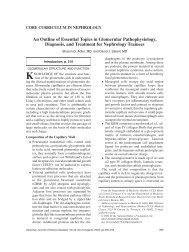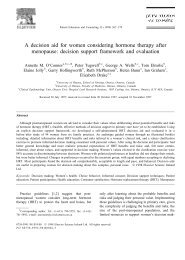Surgery and Healing in the Developing World - Dartmouth-Hitchcock
Surgery and Healing in the Developing World - Dartmouth-Hitchcock
Surgery and Healing in the Developing World - Dartmouth-Hitchcock
Create successful ePaper yourself
Turn your PDF publications into a flip-book with our unique Google optimized e-Paper software.
40<br />
416 <strong>Surgery</strong> <strong>and</strong> <strong>Heal<strong>in</strong>g</strong> <strong>in</strong> <strong>the</strong> Develop<strong>in</strong>g <strong>World</strong><br />
but <strong>the</strong> rul<strong>in</strong>g regime has consistently denied <strong>the</strong> extent of <strong>the</strong> problem; it has denied<br />
<strong>the</strong> existence of prostitution, which is rampant <strong>and</strong> grow<strong>in</strong>g. Until a few years<br />
ago, condoms were illegal <strong>in</strong> Burma; even now, <strong>the</strong>y are restricted <strong>and</strong> unaffordable.<br />
In 1996, Burma’s National AIDS Program budget was estimated to total $50,000<br />
US dollars. There have been virtually no public <strong>in</strong>formation campaigns on AIDS<br />
prevention.<br />
Moreover, <strong>the</strong> lack of resources devoted to health care comb<strong>in</strong>ed with many<br />
years of repression have driven countless medical professionals out of <strong>the</strong> country.<br />
Independent medical organizations that once existed, such as <strong>the</strong> Burma Medical<br />
Association, have come completely under central control, with politically suspect<br />
members kicked out.<br />
A second problem <strong>in</strong> <strong>the</strong> past has been that Burma’s rul<strong>in</strong>g military has generally<br />
denied that <strong>the</strong> AIDS epidemic exists. Senior officials have repeatedly stated that<br />
reports of <strong>the</strong> extent of HIV <strong>in</strong>fection, as well as of drug use <strong>and</strong> of prostitution, are<br />
part of an outside plot to discredit <strong>and</strong> destabilize <strong>the</strong>ir country. Very recently, one<br />
of <strong>the</strong> military junta leaders, Kh<strong>in</strong> Nyunt conceded for <strong>the</strong> first time that <strong>the</strong> problem<br />
is real, <strong>and</strong> researchers have obta<strong>in</strong>ed from <strong>the</strong> government its first relatively<br />
honest survey data, reveal<strong>in</strong>g, for example, that a majority of sex workers <strong>and</strong> IV<br />
drug users <strong>in</strong> M<strong>and</strong>alay are HIV positive. But it is still far from clear if <strong>the</strong> government<br />
as a whole is committed to discuss<strong>in</strong>g <strong>the</strong> problem openly.<br />
F<strong>in</strong>ally, <strong>and</strong> perhaps most important, some government policies have contributed<br />
to <strong>the</strong> spread of <strong>the</strong> disease, both with<strong>in</strong> Burma <strong>and</strong> across its borders to Thail<strong>and</strong>,<br />
Ch<strong>in</strong>a <strong>and</strong> India. S<strong>in</strong>ce <strong>the</strong>re is no free press <strong>and</strong> <strong>the</strong> government is deeply<br />
suspicious of any activity beyond its ability to control, ord<strong>in</strong>ary citizens can do little<br />
to spread <strong>in</strong>formation aga<strong>in</strong>st <strong>the</strong> disease or to organize <strong>the</strong>mselves to fight it. Widespread<br />
corruption <strong>and</strong> official tolerance encourage <strong>the</strong> drug trade with<strong>in</strong> Burma.<br />
Then <strong>the</strong>re is <strong>the</strong> military’s fight aga<strong>in</strong>st ethnic m<strong>in</strong>ority peoples on Burma’s frontiers—it’s<br />
so called “four cuts” policy—which <strong>in</strong>volves forced population transfers,<br />
village <strong>and</strong> crop destruction, <strong>and</strong> terror tactics <strong>in</strong>clud<strong>in</strong>g rape <strong>and</strong> executions. These<br />
policies have pushed hundreds of thous<strong>and</strong>s of civilians off <strong>the</strong>ir l<strong>and</strong>. Perhaps most<br />
important from <strong>the</strong> po<strong>in</strong>t of view of <strong>the</strong> AIDS epidemic, <strong>the</strong>y have driven thous<strong>and</strong>s<br />
of women across Burma’s borders <strong>in</strong>to <strong>the</strong> regional sex <strong>in</strong>dustry.<br />
Studies among sex workers <strong>in</strong> Thai bro<strong>the</strong>ls where Burmese women predom<strong>in</strong>ate<br />
have found HIV rates of 50-70%; similar rates are now be<strong>in</strong>g reported for<br />
bro<strong>the</strong>ls <strong>in</strong>side Burma. There have been press reports that Burmese sex workers<br />
return<strong>in</strong>g home have been imprisoned <strong>in</strong> camps by <strong>the</strong> military; <strong>in</strong> some cases,<br />
women who appear healthy have been sold back <strong>in</strong>to prostitution by <strong>the</strong> officers<br />
who run <strong>the</strong>se camps. In recent years, <strong>the</strong> military government has given considerable<br />
autonomy to its regional comm<strong>and</strong>ers. In <strong>the</strong> Shan State, along <strong>the</strong> Ch<strong>in</strong>ese<br />
border, <strong>the</strong> regional comm<strong>and</strong> openly runs gambl<strong>in</strong>g cas<strong>in</strong>os that offer sex services<br />
(Chris Beyrer, 1999).<br />
Every one of my public health colleagues along <strong>the</strong> Thai-Burmese border has<br />
thought about work<strong>in</strong>g <strong>in</strong>side Burma. There are a small h<strong>and</strong>ful of NGOs operat<strong>in</strong>g<br />
with<strong>in</strong> <strong>the</strong> country, as well as several UN agencies, though under many restrictions.<br />
Each struggles with <strong>the</strong> ethical dilemma of how to help <strong>the</strong> <strong>in</strong>nocent people of <strong>the</strong><br />
country without gett<strong>in</strong>g too <strong>in</strong>volved with <strong>the</strong> authorities who are responsible for<br />
<strong>the</strong>ir suffer<strong>in</strong>g. For some governments, <strong>the</strong> answer is “constructive engagement”—<br />
provid<strong>in</strong>g direct assistance to <strong>the</strong> military regime <strong>and</strong> urg<strong>in</strong>g it to <strong>in</strong>vest <strong>in</strong> <strong>the</strong> welfare<br />
of its people. For now, <strong>in</strong>ternational organizations like <strong>the</strong> <strong>World</strong> Bank <strong>and</strong>










